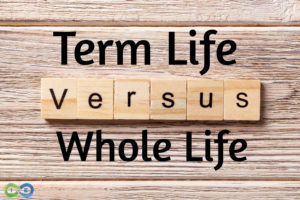When it comes to securing your family’s financial future, life insurance plays a vital role. However, choosing between whole life and term life insurance can be a daunting task. Each type of insurance comes with its own set of features and benefits. In this article, we will delve into the nuances of whole life and term life insurance, helping you make an informed decision about which option aligns best with your financial goals and needs.

Understanding Whole Life Insurance
What is Whole Life Insurance?
Whole life insurance is a type of permanent life insurance that provides coverage for your entire lifetime, as long as premiums are paid. Unlike term life insurance, which offers coverage for a specific period, whole life insurance offers lifelong protection.
How Does Whole Life Insurance Work?
With whole life insurance, a portion of your premium goes towards the death benefit, while another portion is invested by the insurance company to build cash value over time. This cash value grows on a tax-deferred basis and can be accessed through policy loans or withdrawals.
Features of Whole Life Insurance
- Lifetime Coverage: Whole life insurance provides coverage for your entire life, ensuring financial protection for your loved ones.
- Guaranteed Premiums: Premiums for whole life insurance remain fixed for the life of the policy, providing stability and predictability.
- Cash Value Accumulation: Whole life insurance builds cash value over time, which can be utilized for various purposes such as supplementing retirement income or covering unexpected expenses.
Understanding Term Life Insurance
What is Term Life Insurance?
Term life insurance is a type of temporary life insurance that provides coverage for a specific period, typically ranging from 10 to 30 years. If the insured individual passes away during the term of the policy, a death benefit is paid out to the beneficiaries.
How Does Term Life Insurance Work?
With term life insurance, you pay premiums for the duration of the term selected. If you pass away during the term of the policy, your beneficiaries receive the death benefit. However, if you outlive the term of the policy, coverage ends, and no death benefit is paid out.
Features of Term Life Insurance
- Affordability: Term life insurance tends to be more affordable than whole life insurance, making it an attractive option for those on a budget.
- Flexible Coverage Duration: Term life insurance allows you to choose the duration of coverage based on your needs, whether it be 10, 20, or 30 years.
- No Cash Value: Unlike whole life insurance, term life insurance does not accumulate cash value over time. It purely provides death benefit coverage for the specified term.
Comparison of Whole Life and Term Life Insurance
Premiums and Costs
- Whole Life Insurance: Premiums for whole life insurance are typically higher than term life insurance due to the lifelong coverage and cash value accumulation.
- Term Life Insurance: Term life insurance premiums are lower compared to whole life insurance, making it a more affordable option for many individuals.
Coverage Duration
- Whole Life Insurance: Provides coverage for your entire lifetime, offering long-term financial protection.
- Term Life Insurance: Offers coverage for a specific term, making it suitable for temporary needs such as income replacement during working years or paying off a mortgage.
Cash Value Accumulation
- Whole Life Insurance: Builds cash value over time, which can be accessed through policy loans or withdrawals to supplement income or cover expenses.
- Term Life Insurance: Does not accumulate cash value, as it is designed purely for death benefit coverage during the term of the policy.
Flexibility and Customization
- Whole Life Insurance: Offers less flexibility in terms of coverage duration but provides stability with guaranteed premiums and lifelong coverage.
- Term Life Insurance: Provides flexibility in choosing the duration of coverage and can be tailored to meet specific needs such as income replacement or mortgage protection.
Determining the Right Choice for You
When deciding between whole life and term life insurance, it’s essential to consider various factors that align with your financial goals and needs.
Financial Goals and Needs
Consider your long-term financial goals, such as providing financial security for your family, supplementing retirement income, or leaving a legacy for future generations.
Risk Tolerance
Evaluate your risk tolerance and financial situation to determine whether you prefer the stability and guaranteed protection of whole life insurance or the affordability and flexibility of term life insurance.
Budget Considerations
Take into account your budget and affordability when choosing between whole life and term life insurance. While whole life insurance offers lifelong coverage and cash value accumulation, it comes with higher premiums compared to term life insurance.
Conclusion
Choosing between whole life and term life insurance requires careful consideration of your financial goals, risk tolerance, and budget. Both types of insurance offer unique features and benefits, catering to different needs and preferences. By understanding the nuances of each option, you can make an informed decision that provides financial security for you and your loved ones.
FAQs
- Which is cheaper, whole life, or term life insurance?
- Term life insurance tends to be more affordable than whole life insurance due to its temporary coverage and lack of cash value accumulation.
- Can I convert term life insurance to whole life insurance?
- Many term life insurance policies offer the option to convert to whole life insurance without the need for a medical exam, providing flexibility for changing needs.
- Is cash value accumulation important in life insurance?
- Cash value accumulation can provide additional financial flexibility and benefits, such as supplementing retirement income or covering unexpected expenses.
- What happens if I stop paying premiums on whole life insurance?
- If you stop paying premiums on whole life insurance, your policy may lapse, and coverage may be forfeited. However, you may have options such as using accumulated cash value to cover premiums or converting to a paid-up policy.
- How do I determine the right amount of coverage for life insurance?
- The amount of coverage you need depends on various factors such as your income, debts, expenses, and financial goals. Consider working with a financial advisor to determine the appropriate coverage amount for your needs.



